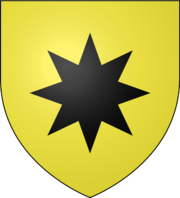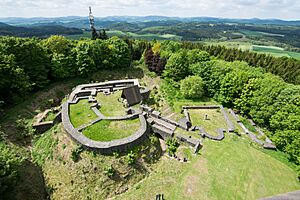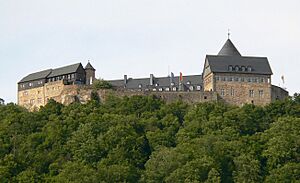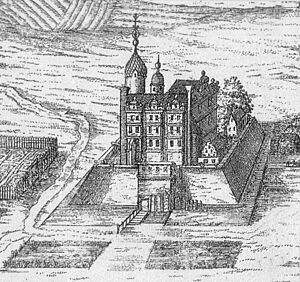Christian, Count of Waldeck-Wildungen facts for kids
Quick facts for kids
Christian, Count of Waldeck-Wildungen
|
|
|---|---|
| Count of Waldeck-Eisenberg (until 1607) Count of Waldeck-Wildungen (since 1607) |
|
| Coat of arms |  |
| Reign | 1588–1637 |
| Predecessor | Josias I of Waldeck-Eisenberg |
| Successor | Philip VII of Waldeck-Wildungen John II of Waldeck-Landau |
| Full name |
Christian Count of Waldeck-Wildungen
|
| Native name | Christian Graf von Waldeck-Wildungen |
| Born | Christian Graf von Waldeck-Eisenberg 24/25 December 1585 Eisenberg Castle |
| Died | 31 December 1637 Waldeck Castle |
| Buried | Marienthal Abbey, Netze (now part of Waldeck) |
| Noble family | House of Waldeck |
| Spouse(s) | Elisabeth of Nassau-Siegen |
| Issue Detail |
|
| Father | Josias I of Waldeck-Eisenberg |
| Mother | Mary of Barby and Mühlingen |
Count Christian of Waldeck-Wildungen (born December 24 or 25, 1585 – died December 31, 1637) was an important ruler in a part of Germany called Waldeck. He became a count in 1588. After a division of land with his brother in 1607, he became the Count of Waldeck-Wildungen.
Christian was the founder of a new branch of the Waldeck family. This branch later led to the princes of Waldeck and Pyrmont. During his time, the independence of Waldeck was greatly threatened by a neighboring state called Hesse. However, Christian, along with his younger brother Wolrad IV, worked hard to keep Waldeck independent. They chose to side with Sweden during the difficult Thirty Years' War. Christian died before the war ended.
Contents
Christian's Early Life and Becoming Count
Christian was born at Eisenberg Castle on December 24 or 25, 1585. He was the oldest son of Count Josias I of Waldeck-Eisenberg and Mary of Barby and Mühlingen.
When Christian's father, Josias I, died suddenly in 1588, Christian and his younger brother Wolrad were still children. This meant they were too young to rule on their own. Their mother and another count, Francis III of Waldeck-Landau, took care of them and ruled Waldeck until they were old enough.
Other branches of the Waldeck family died out around this time. This meant that Christian and Wolrad inherited more land. Francis III, who had no children, left his part of Waldeck to Christian and Wolrad.
Challenges and Conflicts
When Christian became old enough to rule in 1604, he and Wolrad faced many challenges. A big conflict started over who truly had power over Waldeck. This conflict was with Maurice, the Landgrave of Hesse-Kassel.
Maurice changed his religion to Calvinism in 1605. He then tried to force this religion on Waldeck, even though it was against agreements. Christian and Wolrad responded by making Lutheranism the official religion for all of Waldeck.
In 1607, Wolrad became old enough to rule. Even though Christian and Wolrad worked together, they sometimes argued. So, they divided Waldeck. Christian received areas like Wildungen and Waldeck. Wolrad IV received the northern part, including Arolsen. They shared ownership of the city of Korbach.
Christian and Wolrad continued their father's policies to strengthen Waldeck. However, because there hadn't been strong leadership for a while, their efforts led to many conflicts.
In 1612, Christian was present when Matthias was crowned Holy Roman Emperor. The Emperor confirmed Waldeck's special status, meaning it was directly under the Emperor, not under Hesse. But this didn't stop the problems.
From 1614 onwards, Waldeck faced a serious government crisis. There were many tensions within the county. Even more worrying was the pressure from Landgrave Maurice of Hesse. In 1615, Maurice attacked a border town.
To protect Waldeck, Christian and Wolrad decided to join the Wetterauer Grafenverein. This was a group of smaller states that united against Hesse. Christian's marriage to Elisabeth, whose father was also Maurice's father-in-law, helped them gain support from this group.
The biggest conflict came when Christian and Wolrad tried to gain more control over the city of Korbach. This made Landgrave Maurice so angry that he invaded and took over most of Waldeck in 1620. Only Waldeck Castle and Arolsen remained free. Waldeck was in danger of losing its independence completely.
Fighting for Independence
Christian and Wolrad did not give up. The Wetterauer Grafenverein sent soldiers to help. Wolrad IV gained the support of Prince Maurice of Orange, a famous military leader from the Netherlands. This brought the Dutch Republic into the conflict.
Christian, who was also a special assistant to the Emperor, tried to get help from Emperor Ferdinand II. Christian had even saved the Emperor's life during a hunting trip! The Emperor and others put pressure on Landgrave Maurice. In the summer of 1621, Maurice ended his occupation of Waldeck.
After this immediate danger passed, Christian and Wolrad continued to fight for their rights in court. They also demanded payment for the damage caused by Hessian soldiers. In 1630, Emperor Ferdinand II ordered Landgrave Maurice to pay. A settlement was reached in 1632.
In 1624, Christian and Wolrad also gained more control over Korbach, which helped calm things down in Waldeck.
Gaining Pyrmont and the Thirty Years' War
During these difficult times, Waldeck even gained new land. The County of Pyrmont became part of Waldeck. In 1625, Count Hans Louis of Gleichen, who ruled Pyrmont and had no children, agreed to give Pyrmont to Christian and Wolrad IV. Hans Louis died in 1631, and Christian and Wolrad officially took the title of Count of Pyrmont in 1630.
However, the Thirty Years' War brought terrible hardship. Pyrmont, which was far north of Waldeck, was difficult to hold. Another ruler, Prince-Bishop Ferdinand I, claimed Pyrmont and took over Pyrmont Castle in 1629.
In 1631, Christian met King Gustavus II Adolphus of Sweden. Christian decided to side with Sweden in the war, which was a powerful country at the time. After Sweden won a battle in 1633, Pyrmont was returned to Waldeck.
Despite this, Waldeck suffered greatly during the war. Passing armies caused much damage and hardship. In the mid-1630s, the plague also broke out. Imperial troops took Pyrmont Castle again in 1636.
Christian died at Waldeck Castle on December 31, 1637. His son, Philip VII, became the next Count.
Witchcraft Trials
Christian was involved in a series of witchcraft trials in Wildungen that began in 1629. These trials resulted in the deaths of 29 people by 1632.
One writer, Klettenberg, noted that Christian "loved the arts and sciences, and was kind to all scholars. He loved the Word of God and diligently supported churches, schools and hospitals provided and promised that he would eagerly stay with the Protestant religion. But after all, he could not resist the insistence of the clergy, and in 1630 he gave the order to apply extreme measures eradicate the 'vice that is magic'".
Christian's Family Life
Christian married Countess Elisabeth of Nassau-Siegen in November 1604. She was born in 1584 and died in 1661.
Christian and Elisabeth had many children:
- Mary Magdalene (1606–1671), who married Count Simon VII of Lippe-Detmold.
- Sophie Juliane (1607–1637), who married Landgrave Herman of Hesse-Rotenburg.
- Anne Augusta (1608–1658), who married Count John VIII of Sayn-Wittgenstein-Hohenstein.
- Elisabeth (1610–1647), who married Count William Wirich of Daun-Falkenstein.
- Maurice (1611–1617).
- Catherine (1612–1649), who married Count Simon Louis of Lippe-Detmold and later Duke Philip Louis of Schleswig-Holstein-Sonderburg-Wiesenburg.
- Count Philip VII (1613–1645), who took over as Count of Waldeck-Wildungen after his father.
- Christine (1614–1679), who married Count Ernest of Sayn-Wittgenstein-Homburg.
- Dorothy (1617–?), who married Count Emich XIII of Leiningen-Dagsburg-Falkenburg.
- Agnes (1618–1651), who married Count John Philip III of Leiningen-Dagsburg-Emichsburg.
- Sibylle (1619–1678), who married Count Frederick Emich of Leiningen-Dagsburg-Hartenburg.
- Joanne Agathe (1620–1638).
- Gabriel (1621–1624).
- Count John II (1623–1668), who became Count of Waldeck-Landau. He married Alexandrine Maria Gräfin von Vehlen und Meggen, and later Landgravine Dorothy Henriette of Hesse-Darmstadt.
- Louise (1625–1665), who married Gerhard Ludwig Freiherr von Effern.
Images for kids
|
Christian, Count of Waldeck-Wildungen
House of Waldeck
Born: 24/25 December 1585 Died: 31 December 1637 |
||
| Preceded by Josias I |
Count of Waldeck-Eisenberg 1588–1607 |
County divided |
| Newly created | Count of Waldeck-Wildungen 1607–1637 |
Succeeded by Philip VII of Waldeck-Wildungen John II of Waldeck-Landau |
| Preceded by Hans Louis of Gleichen |
Count of Pyrmont 1625–1637 |
Succeeded by Philip VII of Waldeck-Wildungen |
 | Precious Adams |
 | Lauren Anderson |
 | Janet Collins |







